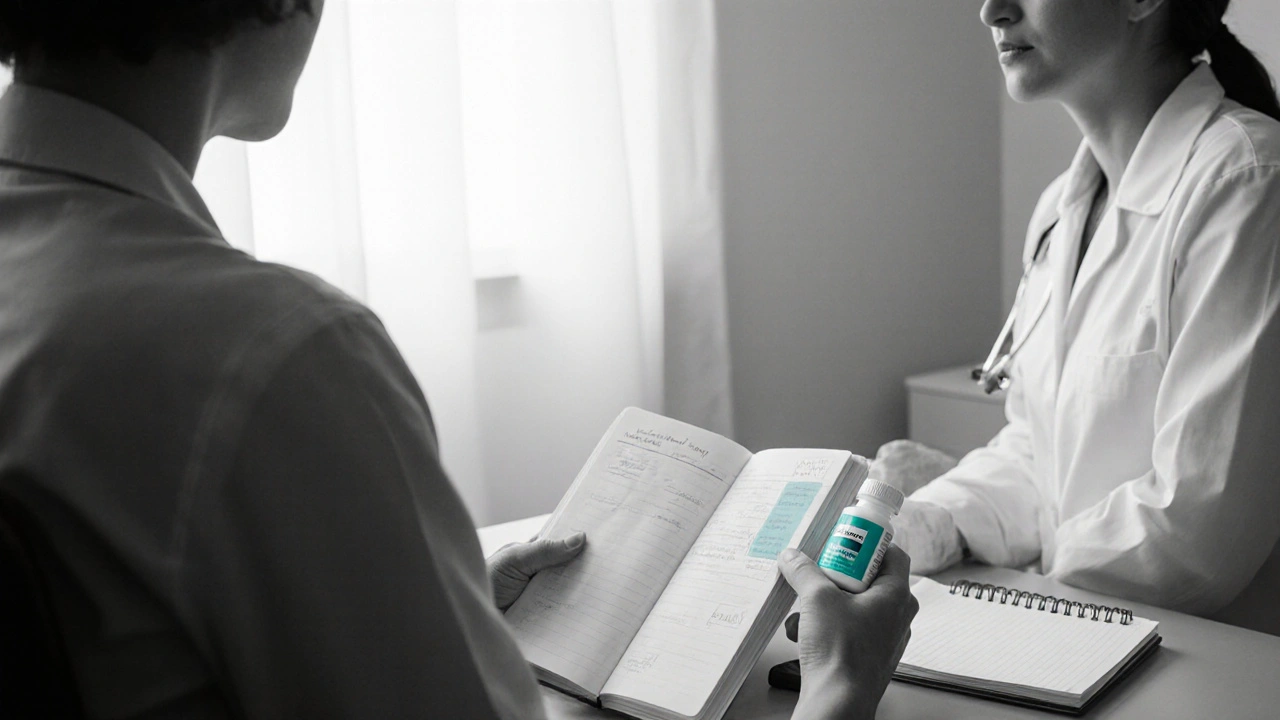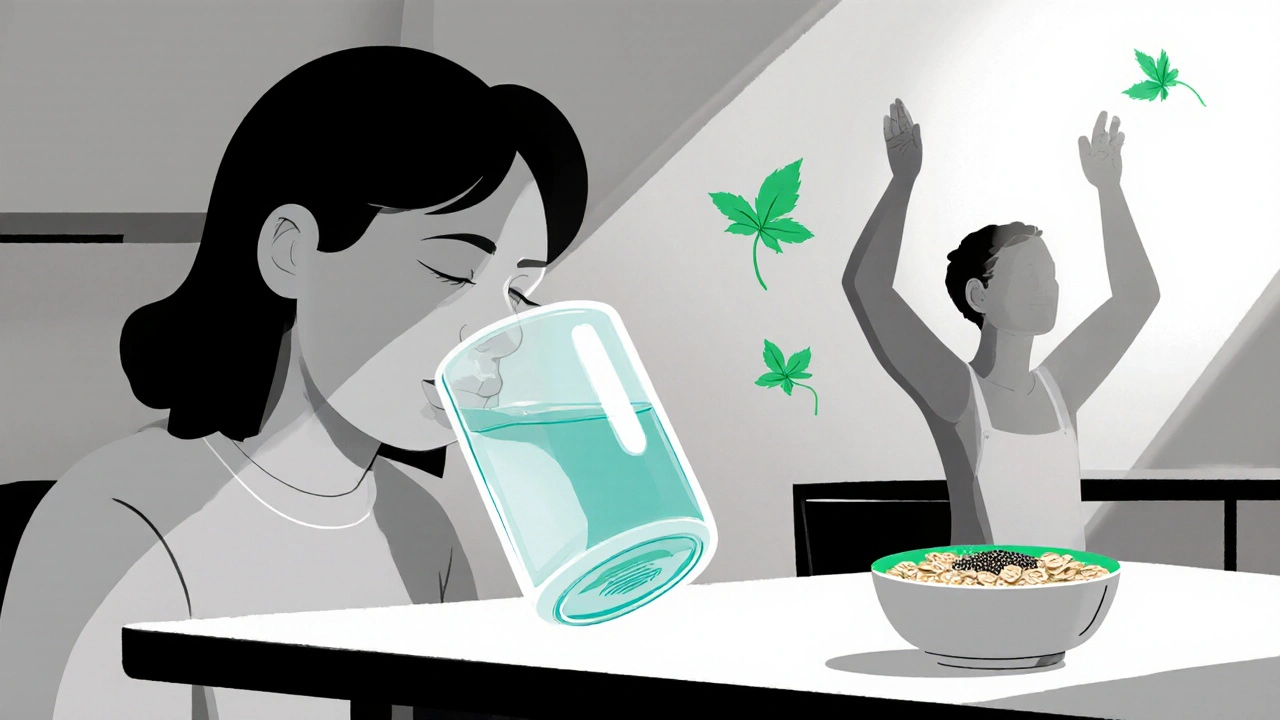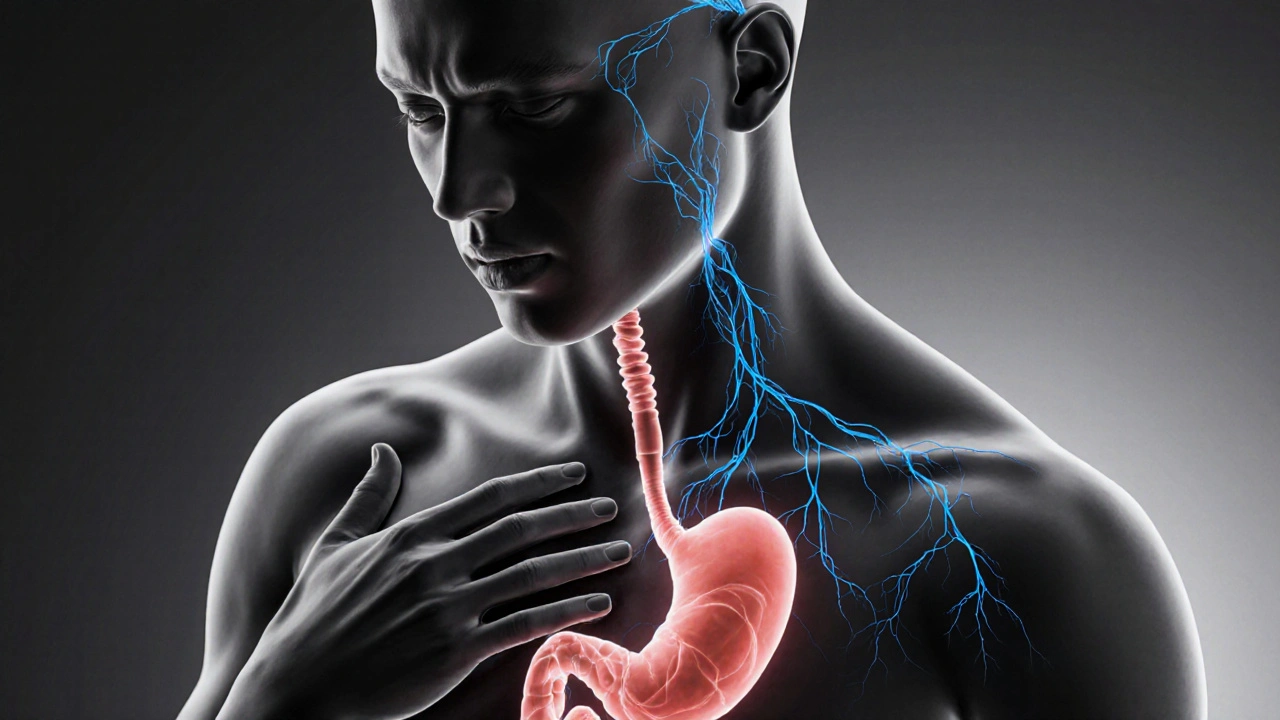IBS Symptom Tracker
Daily Symptom Log
Recent Patterns
Based on your recent entries:
Vomiting has occurred 0 times with mild severity.
Tip: Tracking your symptoms for 2 weeks helps identify trigger foods like high-FODMAP items.
Quick Summary
- Vomiting can be a direct symptom of Irritable Bowel Syndrome or a sign that something else is triggering your gut.
- Common triggers include specific foods, stress, gut‑microbiome imbalance, and certain medications.
- Effective treatment combines dietary changes, stress‑management techniques, and, when needed, targeted medication or probiotics.
- Keeping a food‑and‑symptom diary helps you spot patterns and avoid future flare‑ups.
- Hydration, regular meals, and gentle exercise are simple preventative habits that support overall gut health.
What Are Vomiting and Irritable Bowel Syndrome?
When you feel the urge to empty your stomach forcefully, you’re experiencing vomiting. It’s the body’s way of ejecting unwanted contents, often triggered by an upset digestive system, an infection, or a reaction to something you ate.
Irritable Bowel Syndrome, commonly called IBS, is a functional disorder of the digestive tract. People with IBS experience irregular bowel movements, abdominal pain, bloating, and, in many cases, nausea that can lead to vomiting.
IBS isn’t a disease that damages the gut; it’s a set of symptoms that arise from how the brain and gut communicate. This brain‑gut axis can become hypersensitive, making even normal digestive activity feel painful or uncomfortable.

Why Does Vomiting Happen With IBS?
Several mechanisms link IBS to vomiting:
- Food triggers: Certain foods-like fatty meals, spicy dishes, or high‑FODMAP items-can overstimulate the gut, causing rapid gastric emptying and nausea.
- Gut‑microbiome imbalance: An unhealthy mix of bacteria in the gut microbiome can produce gas and toxins that irritate the stomach lining, prompting the brain to signal vomiting.
- Stress and anxiety: Stress releases cortisol, which alters gut motility and increases sensitivity, often resulting in an upset stomach and the urge to vomit.
- Medications: Some IBS treatments-such as laxatives, antispasmodics, or antibiotics-can have nausea as a side effect.
- Infections: A bout of gastroenteritis can worsen IBS symptoms, and the lingering inflammation may trigger episodic vomiting.
Understanding the exact cause in your case is crucial because it determines the most effective treatment path.
How Doctors Diagnose the Connection
If vomiting becomes frequent, a doctor will want to rule out serious conditions first. Typical steps include:
- Medical history review-focusing on IBS diagnosis, recent diet changes, stress levels, and medication use.
- Physical examination-checking for dehydration, abdominal tenderness, and signs of infection.
- Laboratory tests-blood work to look for anemia, inflammation markers, and electrolyte imbalances.
- Stool analysis-identifying infections or dysbiosis in the gut microbiome.
- Imaging or endoscopy-only if red‑flag symptoms (like blood in stool or severe weight loss) are present.
Once serious disease is excluded, the clinician can focus on IBS‑related triggers for vomiting.
Treatment Options for IBS‑Related Vomiting
There’s no one‑size‑fits‑all cure, but a combination of approaches works for most people. Below is a quick comparison of the most common interventions:
| Option | How It Works | Typical Benefits | Possible Side Effects |
|---|---|---|---|
| Low‑FODMAP Diet | Reduces fermentable carbs that feed gas‑producing bacteria. | Less bloating, fewer nausea episodes. | Potential nutrient gaps if not balanced. |
| Probiotics | Introduce beneficial strains to rebalance gut flora. | Improved digestion, reduced gas. | Mild gas or bloating initially. |
| Antispasmodics (e.g., hyoscine) | Relax smooth muscle in the gut. | Decreased cramping, lower nausea. | Drowsiness, dry mouth. |
| Fiber Supplements | Add bulk to stool, stabilising transit. | Regular bowel movements, less urgency. | Gas, abdominal discomfort. |
| Stress‑Management (CBT, mindfulness) | Modifies brain‑gut signaling. | Reduced overall IBS flare‑ups. | Requires time commitment. |
Most patients find that diet changes are the first line of defense, followed by targeted medication if symptoms persist. Probiotics can be especially helpful for those who notice a gut‑flora upset after a course of antibiotics.

Practical Prevention Tips
Preventing vomiting boils down to keeping your gut stable and your nervous system calm. Here are daily habits that make a real difference:
- Eat smaller, regular meals: Large meals stretch the stomach and can trigger nausea. Aim for 5‑6 modest portions spread across the day.
- Hydrate wisely: Sip water, herbal teas, or oral rehydration solutions. Avoid carbonated drinks and excessive caffeine.
- Identify trigger foods: Keep a simple log of what you eat and any nausea you feel. Common culprits include onions, garlic, beans, and high‑fat dairy.
- Boost fiber gradually: Soluble fiber (oats, chia seeds) supports gut motility without causing sudden gas spikes.
- Consider a probiotic regimen: A daily capsule containing Bifidobacterium and Lactobacillus strains can keep the microbiome balanced.
- Manage stress: Short breathing exercises, a 10‑minute walk, or a quick meditation session can lower cortisol and calm the gut.
- Avoid lying down right after meals: Give digestion a chance to work; wait at least 30 minutes before reclining.
When a nausea episode does hit, try the "5‑5‑5" rule: inhale for 5 seconds, hold for 5 seconds, exhale for 5 seconds. This simple rhythm often reduces the urge to vomit.
Quick Lifestyle Checklist
- Log meals and symptoms for at least two weeks.
- Eliminate high‑FODMAP foods for 4 weeks, then re‑introduce one at a time.
- Drink at least 1.5‑2L of water daily.
- Take a probiotic with at least 10billion CFU each morning.
- Practice a 10‑minute mindfulness session each evening.
- Schedule a follow‑up with your GP if vomiting occurs more than twice a week.
Following this checklist gives you a data‑driven way to see what works and where you might need professional help.
Frequently Asked Questions
Can IBS cause vomiting without other symptoms?
Yes. While abdominal pain and irregular stools are the classic signs, some people experience nausea or vomiting as the first or only symptom, especially after a trigger meal.
How long should I stay on a low‑FODMAP diet?
Typically 4‑6 weeks, followed by a systematic re‑introduction phase to pinpoint which FODMAP groups are truly problematic for you.
Are over‑the‑counter anti‑nausea meds safe for IBS?
Occasional use of antihistamines like dimenhydrinate can help, but they don’t treat the underlying gut issue. Regular use should be discussed with a doctor.
Do probiotics really work for IBS‑related vomiting?
Clinical studies show a modest improvement in nausea and overall gut comfort when specific strains like Lactobacillus rhamnosus are used for at least 8 weeks.
When should I seek emergency care for vomiting?
If you can’t keep any fluids down for 24hours, experience severe abdominal pain, notice blood or black tarry stools, or feel dizzy and weak, go to the emergency department right away.

10 Responses
Your guide is way too long just cut the fluff
Thank you for compiling such a comprehensive overview of IBS‑related vomiting. The inclusion of both dietary and psychological strategies demonstrates a holistic approach that is commendable. I particularly appreciate the emphasis on systematic symptom tracking, as it empowers patients to identify personal triggers with precision. Moreover, the clear delineation of treatment options facilitates shared decision‑making between clinicians and sufferers. In practice, integrating these recommendations can markedly improve quality of life for many individuals.
I have been living with IBS for several years and keeping a meticulous diary as you suggest has indeed shed light on subtle patterns that I previously overlooked - for instance I noticed that my episodes of nausea often followed meals that contained modest amounts of garlic even though I never associated that spice with discomfort before - this realization prompted me to experiment with eliminating certain aromatics and I observed a gradual reduction in vomiting frequency which, while not eliminating it entirely, has certainly made my daily routine less stressful and more predictable - the key takeaway for me is that patience and consistency in logging can yield insights that are otherwise obscured by the chaotic nature of IBS symptomatology
Honestly this post reads like a textbook for the medically obsessed, drowning the reader in jargon while ignoring the real-world frustrations most patients feel. If you wanted to actually help people stop hurling up their meals you’d cut the fluff and give straight‑forward, no‑nonsense advice, not endless tables and checklists. The diet section is decent but the prose feels pretentious and the tone borders on condescending.
I understand the need for thoroughness, however it is also vital to present information in a way that is accessible to everyone regardless of their medical background. By breaking down complex concepts into relatable analogies and offering practical, step‑by‑step guidance, we can foster an inclusive environment where patients feel supported rather than intimidated. Remember, the goal is empowerment through knowledge, not alienation.
When we examine the relationship between mind and gut, we uncover a profound dialogue that mirrors the broader human experience. Practicing mindfulness not only calms the nervous system but also nurtures a deeper sense of self‑awareness, allowing us to recognize early warning signs before they escalate into full‑blown vomiting episodes. Embracing this reflective stance cultivates resilience, turning each challenge into an opportunity for growth.
Whoa there, calm down! You just threw a ton of advice at us like a hurricane and expect us to swallow it whole! It's overwhelming and kind of rude to dump so much info without considering how people actually feel in the moment. Get a grip and maybe tone down the lecture, okay?
Great post! I love how you combined practical tips with encouragement, making it easier for us to stick with the plan. The checklist is a handy tool that can keep anyone on track, and the reminder to stay hydrated is always spot‑on. Keep sharing this kind of helpful content.
Nice stuff! 👍 the checklist is super useful and the tips are easy to follow. really helpful for anyone dealing with IBS vomiting lol
It is astonishing how often we overlook the deeper philosophical implications of a simple act like vomiting when it is linked to IBS. The body, in its relentless pursuit of equilibrium, signals distress through mechanisms that we too often dismiss as merely inconvenient. Yet this signal is a profound reminder that mind and gut are entangled in a dialogue that reflects our inner emotional landscape. When stress mounts, the brain dispatches cortisol, which in turn agitates the gastrointestinal tract, prompting nausea and vomiting as a form of protest. This protest is not a failure but an invitation to scrutinize the underlying anxieties that pervade our daily lives. By embracing a compassionate stance toward our own discomfort, we can transform the episode into an opportunity for self‑reflection. Practicing mindfulness, as previously suggested, equips us with the tools to observe the sensation without immediate judgment. Moreover, maintaining a meticulous symptom diary transforms chaotic experiences into data points that can be analyzed objectively. In doing so, we empower ourselves to identify patterns, whether they be dietary triggers or emotional stressors, that precipitate the vomiting reflex. The act of logging also fosters a sense of agency, counteracting the helplessness that many patients feel. It is essential, however, to recognize that not every episode can be tamed solely by diet or meditation; professional medical guidance remains indispensable. Nonetheless, integrating philosophical introspection with practical measures creates a synergistic approach that addresses both the physiological and existential dimensions of IBS. This holistic perspective honors the complexity of the human organism, refusing to reduce it to a mere collection of symptoms. Consequently, when we experience a bout of vomiting, we might ask ourselves what unspoken emotion is demanding attention. By answering that question, we not only alleviate the physical manifestation but also cultivate inner growth. In summary, the marriage of scientific rigor and philosophical inquiry offers a powerful pathway to resilience and healing.